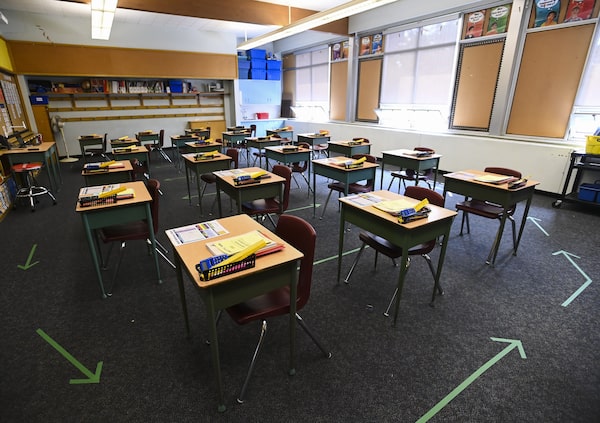
A grade six class room at Hunter's Glen Junior Public School during the COVID-19 pandemic in Scarborough, Ont., on Sept. 14, 2020.Nathan Denette/The Canadian Press
The number of non-certified instructors supervising classrooms in the country’s largest school board more than doubled in February compared with last year, as administrators struggled to fill the gaps left by a pandemic-fuelled increase in teacher absenteeism.
A handful of school boards in Ontario have gone as far as temporarily closing schools and moving students to remote learning because of a supply-teacher shortage.
At the Toronto District School Board, 534 emergency replacement instructors led classrooms last month, up from 204 at the same time last year. Ryan Bird, the board’s spokesman, said the figure represents a small percentage of the overall pool of supply teachers, but it also shows the strain on the public education system.
Certified teachers have graduated with a degree in education and received a certificate from their provincial regulatory body. In exceptional circumstances, boards can ask people to temporarily fill in because of a shortage of substitute teachers.
School boards say that in some cases, principals, vice-principals and even lunchroom supervisors have stepped in to manage classrooms and cover teachers who are ill or have been asked to self-isolate because they are deemed by public health to have been in close contact with a positive case.
Ontario’s Education Minister Stephen Lecce acknowledged in a press conference on Monday that principals and other staff have been asked to step in when a board could not find a supply teacher. He described it as a “challenge.”
Mr. Lecce said the government has made provisions for some students nearing the end of their studies to work as supply teachers. He has also asked the teachers’ unions to once again suspend the 50-day limit that retired teachers can work while collecting their pensions, so retirees can fill in for absences.
Those steps have not been enough, school boards say. The Ottawa-Carleton District School Board closed one of its schools on Monday after 16 staff members were considered high-risk contacts and required to stay home to self-isolate.
“Like other school boards, the OCDSB is facing a severe shortage of replacement staff. Given the inability to find enough replacement staff on short notice, we had to close the school to in-person learning [on Monday],” spokesman Darcy Knoll said.
Similarly, a school in Hamilton is closed this week after two staff members and nine students tested positive. Shawn McKillop, a spokesman for the Hamilton-Wentworth District School Board, said more than half of the staff were considered close contacts, because they either provide supervision duty or teach a particular subject to several classes at the school.
The board decided to move all students to remote learning, he said, because calling in supply teachers “in this quantity would have really been a challenge” given the need to fill absences in other schools as well.
The issue of keeping schools open in light of COVID-19 case numbers and the number of staff in self-isolation has been pushed to the forefront in the Peel region, one of the hardest-hit areas of the country. At a meeting last week, both the public and Catholic school boards requested public health move their students and staff to online learning until mid-April. Another meeting with the local public-health unit was scheduled for this week.
At the Dufferin-Peel Catholic District School Board, students at 12 schools are learning remotely because so many staff are required to self-isolate. Spokesman Bruce Campbell said tightened health and safety requirements that came into place last month mean not only are classes dismissed when there’s a positive case, but also staff who may have had limited contact with the class. This could include principals, vice-principals and support staff.
He said teacher absences, self-isolation precautions and challenges in finding supply teachers “has placed immense pressure on our ability to provide safe supervision and to maintain delivery of in-person education in some schools.”
Our Morning Update and Evening Update newsletters are written by Globe editors, giving you a concise summary of the day’s most important headlines. Sign up today.
 Caroline Alphonso
Caroline Alphonso